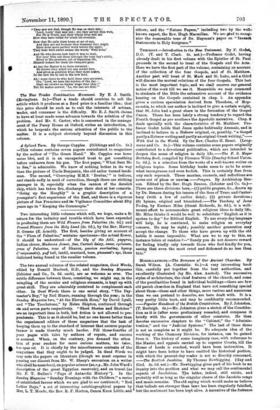THBOLOGY.—/ntroduetion to the New Testament. By F. Goal*, D.D. (T.
and T. Clark. 6s. net.)—Professor Godet, having already dealt in his first volume with the Epistles of St. Paul proceeds in the second to treat of the Gospels and the Acts. Here we have the first part of the volume, oontaining an account of the collection of the four Gospels, and of St. Matthew. Another part will treat of St. Mark and St. Luke, and a third will discuss the mutual relations of the four Gospels. This last is the most important topic, and we shall reserve our general notice of the work till we see it. Meanwhile we may commend to students of the Bible the exhaustive account of the evidence bearing on the Gospels contained in chap. 1. An appendix gives a curious speculation derived from Theodore, of Mop- sa estia, to which our author is inclined to give a certain weight, that St. John had a great share in the formation • of the Gospel Canon. There has been lately a strong tendency to regard the Fourth Gospel as par excellence the Apostolic narrative. Chap. 2 deals specially with the characteristics of St. Matthew. Pro- fessor Godet holds that Jesus spoke habitually Aramaic, and is inclined to believe in a Hebrew original, or, possibly, "a Gospel partly a Hebrew writing and partly an original Greek writing."— With God in the World. By the Rev. Charles H. Brent. (Long- mans and Co. 3s.)—This volume contains some papers originally contributed to a devotional publication, which are intended to deepen the sense of religion in daily life.—The F. B. Meyer Birthday Book, compiled by Florence Wills (Sunday School Union. Is. 6d.), is a selection from the works of a well-known writer on religious topics. Some birthday books seem to us to be some- what incongruous and even foolish. This is certainly free front any such reproach. These maxims, counsels, and reflections are never out of place or unwise.—Prayers. By Archbishop Ben- son. Edited by the Rev. Hugh Benson. (Isbister and Co. 6s.)— There are three divisions here,—(1) public prayers, &c., drawn up by Dr. Benson during his tenure of the Sees of Truro and Canter- bury (with a few of earlier date) ; (2) private devotions ; (3) hymns, original and translated.—The Teaching of Jesus To-day, by Eustace Miles (Grant Richards, 2s. 6d.), is a well- meant effort to accommodate great religious ideas to daily life. Mr. Miles thinks it would be well to substitute "English as it is spoken today" for Biblical English. To use every-day language will help, he is convinced, to make religion an everyday concern. He may be right ; possibly another generation may accept the change. To those who have grown up with the old habits it seems impossible. What are we to say to this, an instance taken at random ?—" Surely you do not deserve reward for feeling kindly only towards those who feel kindly for you, seeing that even the most cruel and dishonest do no less than this."










































 Previous page
Previous page